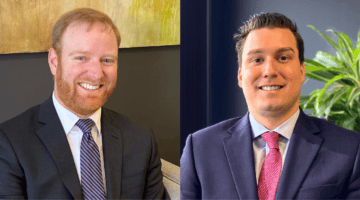Across the country, hospitals and healthcare providers are facing an unprecedented surge of patients with COVID-19 symptoms while continuing to care for patients with other medical conditions. Responding adequately to the surge has required the federal and state governments to take some creative steps. In Massachusetts, this included easing licensing and credentialing restrictions to permit additional providers to care for patients.
All of these health care providers are risking their lives every day to save others. And yet, they face potential legal liability for the care and treatment they are providing, even as conditions are worsening, providers are falling sick, supplies and resources are limited, and patients are beginning to outnumber available beds. In Massachusetts, last week, Governor Charlie Baker proposed legislation that would provide some protections to health care providers facing potential civil liability while they work on the front lines of the COVID-19 pandemic. The Legislature acted swiftly in response and passed a revised bill, S.2640 that Governor Baker signed on April 17th. The Act became effective immediately after Governor Baker signed it.
The Legislation
The legislation provides immunity to health care providers and health care facilities (collectively “Provider(s)”) from claims for damages alleged to have been sustained by their acts or omissions in the course of providing services during the period of the COVID-19 emergency if the following three conditions are met:
- The health care services are provided pursuant to a COVID-19 emergency rule and in accordance with otherwise applicable law;
- The provision of care or treatment was impacted by the Provider’s decisions or activities in response to conditions that resulted from the COVID-19 outbreak or COVID-19 emergency rules; and
- The Provider arranged for or provided the health care services in good faith. Good faith is specifically defined to include acts or omissions that are consistent with the guidelines for crisis standards of care for the COVID-19 pandemic issued by the Department of Public Health and to exclude acts or omissions that are based on race, ethnicity, national origin, religion, disability, sexual orientation or gender identity, deceptive acts or practices, and fraud.
Significantly, the protections are not limited to the provision of care and treatment to COVID-19 patients, but include care rendered to any individual who presents to a health care facility or provider during the period of the COVID-19 emergency. This is broader than the proposed bills being considered by other states and makes sense, given that Providers and resources have been focused predominantly on responding to the COVID-19 emergency, leaving fewer Providers and resources to care for and treat other patients. While the Act does not specifically address resource or staffing shortages, it is likely that the liability protections will extend to decisions resulting from these shortages provided that they are made in good faith and are consistent with the DPH’s guidelines regarding allocation principles.
The liability protections do not apply if the damages were caused by acts or omissions constituting gross negligence, recklessness, or conduct performed with an intent to harm or to discriminate based on race, ethnicity, national origin, religion, disability, sexual orientation or gender identity. It also does not apply to consumer protection actions brought by the attorney general or to false claims actions brought by or on behalf of the Commonwealth.
The legislation applies broadly to Providers practicing in the Commonwealth, including hospitals, skilled nursing facilities, assisted living residences, rest homes, community health centers, home health agencies, doctors, nurses, respiratory therapists, nursing home administrators, pharmacists, physician assistants, allied health professionals, mental health professionals, social workers, psychologists, certified nursing aides, home health aides, and emergency medical service providers. It also applies to individuals and facilities specifically empowered to provide care in response to COVID-19, including individuals providing health care services within the scope of authority or licensed by a COVID-19 emergency rule and sites designated by the commissioner of public health to provide COVID-19 health care services such as step-down skilled nursing facilities, field hospitals, and hotels.
The legislation applies to all claims based on acts or omissions that occur or have occurred during the period of the COVID-19 emergency, which was declared on March 10, 2020.
Federal Legislation
Certain “volunteer” providers also may have immunity under the CARES Act. Section 3215 of the Act provides, with certain exceptions, that “volunteer” health care providers “shall not be liable under Federal or State law for any harm caused by an act or omission of the professional in the provision of health care services” during the COVID-19 public health emergency. The provider must be a volunteer and the services rendered must be within the scope of the provider’s license, including any applicable state law emergency expansions of that scope of practice. As with the proposed Massachusetts legislation, providers are not protected from liability for harm resulting from willful or criminal misconduct, gross negligence, reckless misconduct, or “conscious flagrant indifference” to the patient’s rights or safety.
Takeaways
Providers should note that neither the Massachusetts legislation nor the CARES Act provides “absolute” immunity from legal claims. Moreover, terms such as “gross negligence” and “willful misconduct” also are subject to judicial interpretation, which will consider the facts and circumstances of particular cases.
There are practical steps that providers can and should take to protect themselves from the liability claims that are likely to arise from the COVID-19 pandemic despite these legislative efforts.
First, they should carefully document their thought processes and actions in the event that they are later questioned. This may be difficult in an environment that likely will be stressful and potentially chaotic.
Second, they should attempt to communicate clearly and in a caring and meaningful way with anxious family members. While opportunities for face-to-face interaction are limited, the importance of clear communications becomes even more important. The use of technology during the pandemic has evolved, and if used appropriately, may help facilitate communication. For example, there are reports of nurses and hospital chaplains using baby monitors and cell phones to connect patients with their family members.
Providers with concerns about what and with whom information can be shared should keep in mind that the federal government has relaxed its enforcement of HIPAA requirements in limited circumstances during the COVID-19 emergency. See Department of Health and Human Services Office of Civil Rights February, 2020 bulletin “HIPAA Privacy and Novel Coronavirus” and March, 2020 bulletin “COVID-19 & HIPAA Bulletin: Limited Waiver of HIPAA Sanctions and Penalties During a Nationwide Public Health Emergency.” In addition, HIPAA already permits certain disclosures to family members if certain conditions are met. Providers may share protected health information with a patient’s family members, relatives, friends, and other persons identified by a patient as involved in the patient’s care. When possible, prior to disclosure, Providers should get verbal permission from patients or otherwise be able to reasonably infer that the patient does not object to the disclosure. If the patient is incapacitated or unconscious, Providers may share relevant information if the Provider determines in her professional judgment that doing so is in the best interests of the patient. For example, a Provider may determine that it’s in the best interest of an elderly patient to share relevant information with the patient’s adult child, but could not share unrelated information about the patient’s medical history. See 45 Code Fed. Regs. § 164.510(b).
Conn Kavanaugh thanks the members of the health care community who are facing great personal risk as they care for patients with COVID-19 and others who require care. We will continue to monitor the existing and proposed legislation during the COVID-19 pandemic and will update this post as additional information becomes available.
Share with your network:

